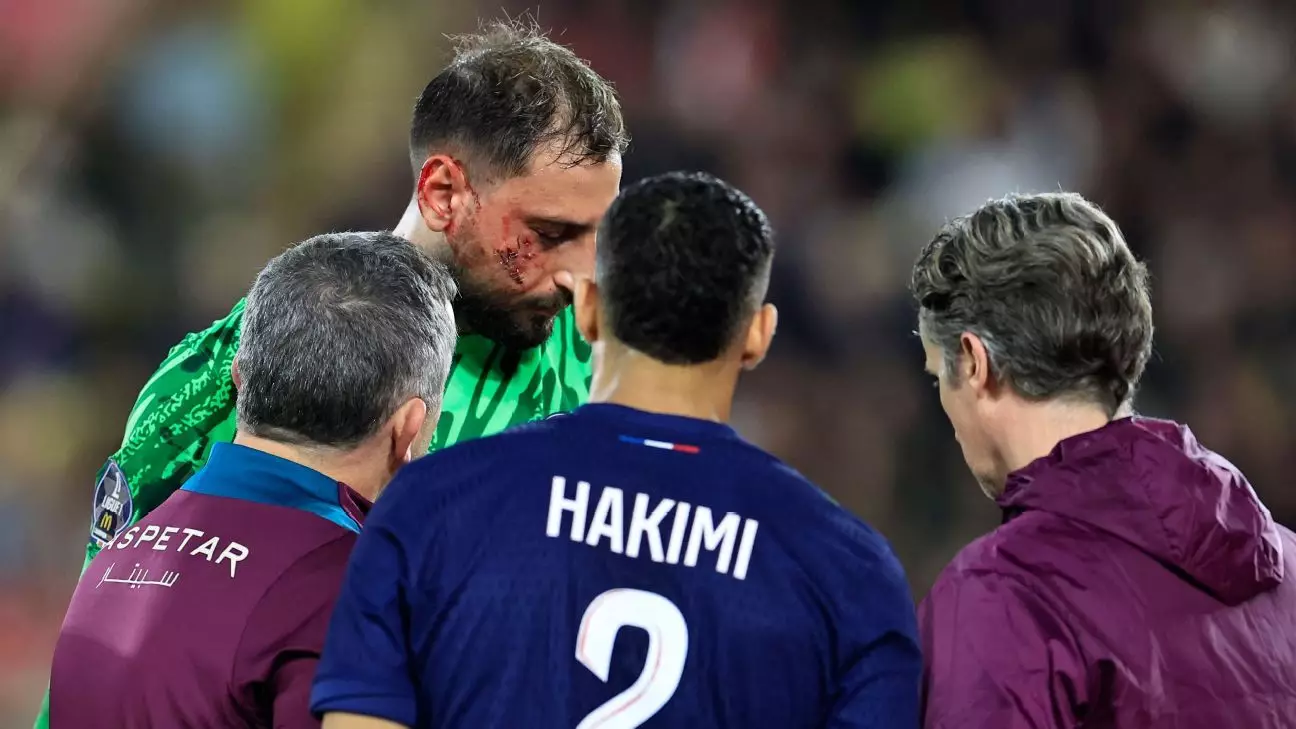In the thrilling atmosphere of Ligue 1, a seemingly routine match turned into a distressing incident for Paris Saint-Germain (PSG) and its star goalkeeper, Gianluigi Donnarumma. During a high-paced showdown against AS Monaco, Donnarumma suffered a facial injury after colliding with the cleat of Monaco’s Wilfried Singo. This moment, occurring in the 17th minute, not only emphasizes the potential brutality of professional football but also raises questions surrounding player safety and officiating standards.
As Donnarumma was executing a sliding save, he became the unfortunate victim of Singo’s desperate attempt to recover from a blocked shot. The resulting impact left Donnarumma bloodied and sprawled on the field, requiring medical attention. Reports indicated he sustained cuts below his right eye, underlining the severe risks that goalkeepers face when they occupy such a vulnerable position on the field. After receiving treatment, Donnarumma was substituted for Matvei Safonov, a move that underscored the seriousness of his injuries.
PSG’s medical team soon disclosed that Donnarumma would undergo further examinations and would require a period of rest. The decision to bench him reminds fans and players alike that success on the pitch often comes at the cost of physical well-being.
Refereeing Decisions and Player Intent
Despite the gravity of the incident, PSG manager Luis Enrique refrained from criticizing the referee, Francois Letexier, for not issuing a card to Singo, even after he had already received a warning earlier in the match. Enrique’s reluctance to chastise the officiating reflects an understanding of the complexities that referees face in fast-paced environments. He empathized with players’ intentions, suggesting that most do not aim to injure one another. However, this incident raises a crucial point regarding the consistency and clarity of officiating in such emotionally charged matches, where the safety of players should always be paramount.
With the victory over Monaco, PSG has positioned itself ten points clear at the top of the Ligue 1 standings. Yet, the team finds itself in a precarious situation within the Champions League. With two matches remaining, PSG is currently outside the qualification spots, reflecting a struggle to adapt to the new format of Europe’s premier club competition. This juxtaposition of domestic success and international difficulties marks a tumultuous period for the club, emphasizing the ongoing challenges that elite teams face in maintaining their status.
The early scheduling of this match, intended to avoid conflicts with future fixtures like the Trophée des Champions, adds a layer of complexity to an already intricate season. The decision to advance the match suggests logistical considerations often take precedence over player welfare, a theme that remains ever-relevant in the world of professional sports.
As players push through matches fueled by passion, the physical toll is inevitable. Gianluigi Donnarumma’s unfortunate injury serves as a poignant reminder of the risks involved in professional football. The incident underscores the need for ongoing discussions about player safety and officiating standards in competitive sports. While PSG continues to strive for glory, the shadow of injuries looms large, posing questions that require thoughtful responses from all involved in the sport.

